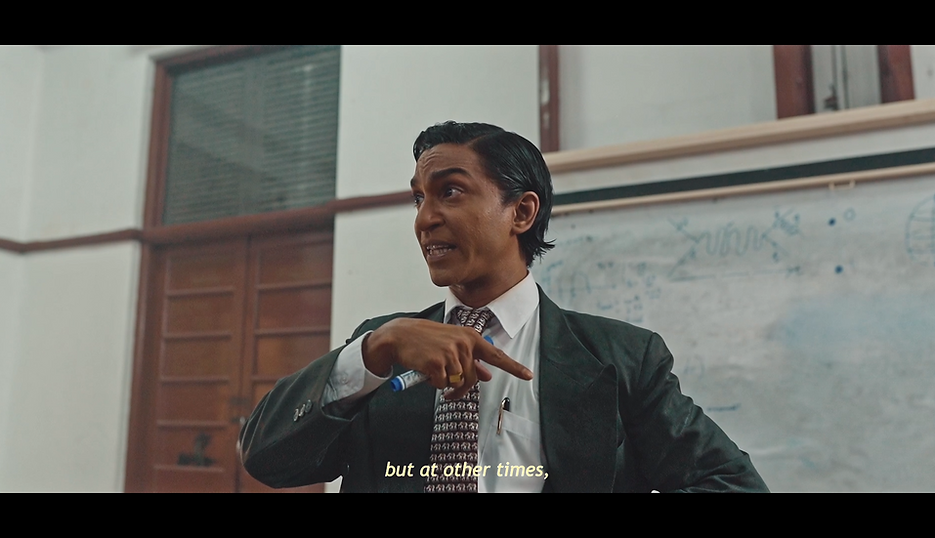Sahurda
Critic:
William Curzon
|
Posted on:
Nov 10, 2025

Directed by:
Janith Imaduwage
Written by:
Janith Imaduwage
Starring:
Pasan Ranaweera, Sasindu Randi
Sahurda follows Adeesha (Sasindu Randi), a postman, who dedicates his life to his work. Due to being incredibly busy with his job, he barely has time to spend with his loving wife. One day, while delivering letters to a house, he discovers a letter without an address and notices many other letters that are similar. Adeesha then goes on a journey of discovery, attempting to decipher the meaning behind the letters. The narrative was inspired by Nobel Laureate Richard Feynman, whose letters to his wife influenced the creation of the piece.
The film opens with a washed-out and indistinct look, as it tracks the protagonist wandering the neighbourhood delivering letters to houses. Formally, the piece is mostly impressive with its evasive and moody atmospheric score, which pervades sequences of exploration throughout Adeesha’s routine. At the same time, the narrative feels rather aimless; however, a plethora of technical elements soar, in particular Eshan Manusanka’s camerawork, which utilises a mix of close-ups and fixed shots following Adeesha and the environments around him. On the other hand, some of the editing is jarring as it rapidly cuts from one sequence to another while bizarrely shifting aspect ratios. Audio can also be cut out at times, almost taking you out of the experience entirely, which could have potentially been thanks to its budget restraints.
The central performance from Sasindu Randi is genuinely compelling as he radiates a profound level of nuance and restraint, hiding his deep melancholy behind his work. One of the most compelling aspects of the film is the relationship that is briefly depicted through scenes of flashbacks, giving the viewer a minor glimpse of the warmth that blossomed between Professor Philips Fernando (Pasan Ranaweera) and his wife and the sheer regret that looms over him by the time lost. Even with its shortcomings along the way and the minor runtime, the piece still manages to emotionally resonate as a viewer, especially given that it's based on a real letter. A deeper characterisation and exploration into their relationship with a prolonged runtime, however, could’ve potentially fleshed out the ideas the filmmakers wanted to delve into and made the finished cut more impactful. The climax is also abrupt, and tonally it feels confused and misguided at times, particularly in how sentimental it presents itself, as well as in the devastating nature of the central revelation. A bizarre use of visuals is apparent throughout the credits, which bears no resemblance to the narrative, accompanied by an oddly inserted post-credit scene, which adds nothing to the conclusion.
Miyuranga Wickramasinghe’s musical score is profound and understated, effectively anchoring moments of stillness while Professor Philips reflects on the past and present. Thematically, the screenplay draws comparisons to quantum computing when discussing the unpredictability of uncontrollable impulses within complex problems, particularly in younger individuals. The supporting cast is terrific, especially Pasan Ranaweera, who, in his portrayal of Professor Philips, displays an incredible degree of confidence and nuance, balancing the more dialogue-heavy sequences when discussing the intricacies of quantum computing and the more intimate moments of reflection.
Sahurda is a profoundly moving depiction of regret and grief over the time lost between two individuals, with its heart in the right place. It may suffer from minor technical issues and baffling tonal redirects visually, and it does not have much to chew on thematically either. However, the two lead performances from Pasan Ranaweera and Sasindu Randi are astounding in their dual characterisation, both in search of closure in their respective arcs.
.png)


